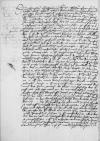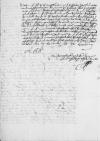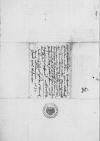 GStA, PK, HBA, C 2, No 121. 1 unnumbered
GStA, PK, HBA, C 2, No 121. 1 unnumbered
Durchlauchter(r), hochgeborner(r) furst, / hochgunstiger, freunttlicher(r), lieb(e)r herr(r). / Mein(n) freuntliche, / gancz willige un(n)d fleissige dienst noch al meynem(m) vormugen zuvoran(n) etc.
Es hoth mir negst der edle h(e)r ⌊Achacius Czeme⌋, danczker castellan, E(wer) F(urstliche) D(urchlauch)t freuntlich und hochgunstig eig(en) ⌊⌋ uberreicht, das ich mit sundren freuden entfang(en) und gelesen, / darinnen sich E(wer) F(urstliche) D(urchlauch)t so vil gunstig mit offenem(m) gemuet gen mir entdeckt / un(n)d iren geneigten(n), zugethanen willen(n) und freuntschafft, die E(wer) F(urstliche) D(urchlauch)t zu mir tregt, klerlich anczeigt, / ouch durch paper damaged⌈[h]h paper damaged⌉ den h(e)rn castellan entpotten(n), / das ich nicht weis, / wie und wasserley gestalt ich da vor E(wer) F(urstliche) D(urchlauch)t sol dancken(n). / Ist ouch vil zu vil und uber al inein vordienst, das sich so gancz freuntlich / und geneigt E(wer) D(urchlauch)t gen mir tu erbitten(n) und nachparlichen(n) halten(n) wil, / wie ich ouch zuvor alweg(en) von E(wer) D(urchlauch)t gespurt und befunden(n). / Macht mich hiemit hoch vorpflicht / und der gestalt, / so mirs muglich, ouch mher(r) E(wer) F(urstliche) D(urchlauch)t vorbunden(n), / der zuvorsicht, das h(er) ⌊Nibschiczen⌋ kein ursach sol gelossen werd(en) zcwisch(e)n uns unser nachparschafft halben(n) zu handlen(n), / es wer dan, das er sich vor sichselbst darzu begebe. / So solten ⌊im⌋, / heth er ouch ⌊Absolonus Har(r)⌋ / wynniger(r), dan eynem(m) gancz glaczigen bleiben(n). / Darzu wil ich ⌊im⌋ E(wer) D(urchlauch)t zcedel mit den erst(en) schick(en) etc. Hie ist ouch von im ein briff an E(wer) D(urchlauch)t, den mein diner negst von ⌊Krako⌋ mit sich gebrocht, / darin E(wer) D(urchlauch)t wirt finden, was newes das mol bey hove gewest. Er klagt mir fast sere, das er(r) uff sein alte tage / und gen den winter(r) sich zu meynem(m) hochgunstig(en) h(e)rn margraff(en) Jorgen(n) gen ⌊Prage⌋ sol vorfueg(en). / Es ist im aber, / wie ich sein gemuet weis, / nicht herczlich, / dan er dem hochleblichen(n) ⌊Hanse Brandenburg⌋ gern(n) dint etc. Der froluckung, die abermals in irem schreib(e)n so wol uff mein, alse written over und⌈und alse alse written over und⌉ des h(e)rn ⌊electenperson⌋ E(wer) F(urstliche) D(urchlauch)t thuch, sage und schreib ich so vil danck, alse mir um(m)er muglich, / der gleichen der h(e)r elect ouch wirt thun. / Und wie ich nicht zcweifel, / so sich gen E(wer) D(urchlauch)t vorhalten(n) in allem(m), das die dar an(n) sol ein wolgefallen(n) haben(n). / Wir hab(e)n uns ouch so samptlich gen E(wer) D(urchlauch)t zu erczeigen und wirklich zu beweisen under uns vorsprochen(n), / das wir an underlass lieb und dienst zu thun E(wer) F(urstliche) D(urchlauch)t wollen(n) schuldig sein(n) etc.  GStA PK, HBA, C2, No 121 2 unnumbered Das E(wer) F(urstliche) D(urchlauch)t iren(n) amptleuten wil befhelen(n), sich freuntlich und nachparlich gen die meine zu halten(n), / das geschicht aus sunderer, hocher, / furstlicher(r) tugent, / do mit Goth der(r) almechtige E(wer) F(urstliche) D(urchlauch)t / und mit vil andren(n) tugenden(n) / begebt. / Der wolle die in E(wer) D(urchlauch)t teglich sterken und mheren(n) / und zu langer, glukseliger(r) regierung, / ouch zu des leibs und der selen(n) seligheit lossen gereichen(n), / darum(m)b ich, wie ein superinscribed⌈einein superinscribed⌉ grosser bussender sunder, Gothe zu bitten(n) nicht wil nachlassen(n), dem(m) ich E(wer) F(urstliche) D(urchlauch)t mit meiner(r) hochgeliebt(e)n ⌊beichtochter(r)⌋ mit langweriger gesuntheit und alter wolfart in sein gnad und barmherczigheit / und mich in E(wer) F(urstliche) D(urchlauch)t gunst thue befelen(n) / bittend, meiner(r) hochgedocht(e)n beichtochter(r) meine gastliche dienst und inniges gebeth anzusag(en). /
GStA PK, HBA, C2, No 121 2 unnumbered Das E(wer) F(urstliche) D(urchlauch)t iren(n) amptleuten wil befhelen(n), sich freuntlich und nachparlich gen die meine zu halten(n), / das geschicht aus sunderer, hocher, / furstlicher(r) tugent, / do mit Goth der(r) almechtige E(wer) F(urstliche) D(urchlauch)t / und mit vil andren(n) tugenden(n) / begebt. / Der wolle die in E(wer) D(urchlauch)t teglich sterken und mheren(n) / und zu langer, glukseliger(r) regierung, / ouch zu des leibs und der selen(n) seligheit lossen gereichen(n), / darum(m)b ich, wie ein superinscribed⌈einein superinscribed⌉ grosser bussender sunder, Gothe zu bitten(n) nicht wil nachlassen(n), dem(m) ich E(wer) F(urstliche) D(urchlauch)t mit meiner(r) hochgeliebt(e)n ⌊beichtochter(r)⌋ mit langweriger gesuntheit und alter wolfart in sein gnad und barmherczigheit / und mich in E(wer) F(urstliche) D(urchlauch)t gunst thue befelen(n) / bittend, meiner(r) hochgedocht(e)n beichtochter(r) meine gastliche dienst und inniges gebeth anzusag(en). /
E(wer) F(urstliche) D(urchlauch)t
ganczvorpflicht(er) vorbitte(n) ⌊Ioannes⌋, colmisch(e)r bisch(off), post(ulirt) zu ⌊Ermeland⌋ s(cripsi)t
 GStA, PK, HBA, C 2, No 121. 3 unnumbered
GStA, PK, HBA, C 2, No 121. 3 unnumbered  GStA, PK, HBA, C 2, No 121. 1 unnumbered
GStA, PK, HBA, C 2, No 121. 1 unnumbered  GStA PK, HBA, C2, No 121 2 unnumbered Das E(wer) F(urstliche) D(urchlauch)t iren(n) amptleuten wil befhelen(n), sich freuntlich und nachparlich gen die meine zu halten(n), / das geschicht aus sunderer, hocher, / furstlicher(r) tugent, / do mit Goth der(r) almechtige E(wer) F(urstliche) D(urchlauch)t / und mit vil andren(n) tugenden(n) / begebt. / Der wolle die in E(wer) D(urchlauch)t teglich sterken und mheren(n) / und zu langer, glukseliger(r) regierung, / ouch zu des leibs und der selen(n) seligheit lossen gereichen(n), / darum(m)b ich, wie ein superinscribed⌈einein superinscribed⌉ grosser bussender sunder, Gothe zu bitten(n) nicht wil nachlassen(n), dem(m) ich E(wer) F(urstliche) D(urchlauch)t mit meiner(r) hochgeliebt(e)n
GStA PK, HBA, C2, No 121 2 unnumbered Das E(wer) F(urstliche) D(urchlauch)t iren(n) amptleuten wil befhelen(n), sich freuntlich und nachparlich gen die meine zu halten(n), / das geschicht aus sunderer, hocher, / furstlicher(r) tugent, / do mit Goth der(r) almechtige E(wer) F(urstliche) D(urchlauch)t / und mit vil andren(n) tugenden(n) / begebt. / Der wolle die in E(wer) D(urchlauch)t teglich sterken und mheren(n) / und zu langer, glukseliger(r) regierung, / ouch zu des leibs und der selen(n) seligheit lossen gereichen(n), / darum(m)b ich, wie ein superinscribed⌈einein superinscribed⌉ grosser bussender sunder, Gothe zu bitten(n) nicht wil nachlassen(n), dem(m) ich E(wer) F(urstliche) D(urchlauch)t mit meiner(r) hochgeliebt(e)n 

